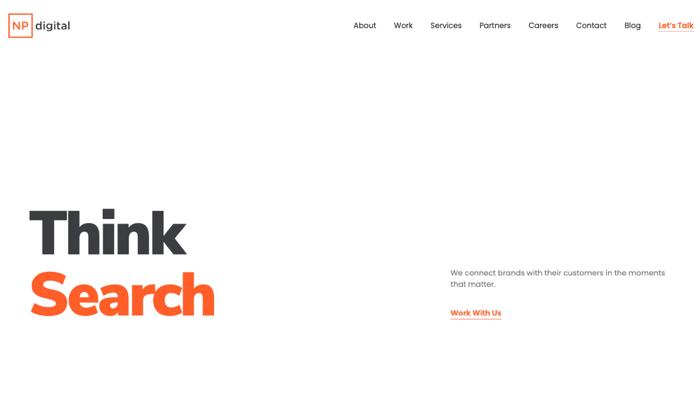
According to Unbounce, half of the people who click on your ads are more likely to make a purchase than those who came from an organic link.
That’s a bit surprising.
You’d think with 600 million devices running ad blockers —advertising would be less effective. Google Ads commands 73.1 percent of search advertising, roughly $40.3 billion. Advertisers couldn’t afford to continue spending that much money on ads if they didn’t work.
Google Ads are effective.
What’s tough for many companies is choosing the right AdWords Agency. Managing Google Ads takes a lot of time, effort, and energy. Most companies choose to outsource that hard work to a PPC agency. If you plan on doing the same, you’re going to need to know how to choose the right agency to manage your Google Ads.
Here’s how you do it.
Know Your Goals and Desired Outcomes
Google Ads is a direct response platform where customers are searching directly for your product or service. To achieve profitable results with your Google Ads campaigns, you’ll need to have some concrete goals in mind. In general, companies focus their attention on a few specific goals, such as these listed on Google’s website:
- Get more calls to your business: Use this goal to book appointments, schedule a job, get customers, on the phone, or close a deal.
- Increase visits to your store: If you’re a local business, you’ll want to generate foot traffic to your physical location via your Google Ads campaign. This goal would be all about generating offline demand.
- Drive people to your website: The all-purpose goal that’s focused on sending people to a specific website so they can fill out a form, purchase your product, request more information about your services, or opt-in to your mailing list.
The ultimate goal for each of these is revenue; each of the examples above would be considered a lead. Unlike SEO, where results require weeks or months of work, Google Ads is a direct response channel. A successful ad triggers immediate action from searchers.
The focus is on action.
Next, you’ll want to create specificity around your goals. This depends on a few factors like your budget, the keywords you choose, match types, etc. For example, if you’re running a service business, you know you’ll need a certain amount of leads. This means you’ll need to identify details like your:
- Breakeven cost per click (CPC): This is the most you’re able to pay to receive a click without losing money.
- Conversion rate: Most people know this one; it’s the total number of conversions divided by the total number of visitors you’ve received. How many conversions do you need to be profitable?
- Breakeven cost per conversion (CPA): The average cost of a conversion.
- Breakeven cost per lead (CPL): The most you can afford to spend to acquire a new lead.
- Customer lifetime value: This measures the total value of a customer over the course of the relationship.
There are more metrics you’ll need to track, but your agency can manage these for you and provide you with the reporting you need once you’re up and running. Providing your agency with these numbers makes it easier to set things up; you can use these to set your daily/monthly budget, identify profitable campaigns at-a-glance, or set goals to boost profitability.
It would be best if you had a rough idea of the numbers you need to be profitable — the number of leads, sales, and customers you need each month for the campaign to be self-sustaining.
7 Characteristics That Make a Great AdWords Agency
Here are some things you’ll want to look for when vetting an AdWords agency. These characteristics are important must-haves. Use them to determine if the agencies you’re considering are a good fit.
1. Professional certification
The agencies you’re considering should have Google Partners status. Google explains this more, sharing why this is so important for your agency:
“Achieving Partner status means that your company has demonstrated Google Ads skill and expertise, met Google ad spend requirements, delivered company agency and client revenue growth, and sustained and grown its client base. Partner status gives your company access to a number of benefits, including the Google Partner badge that can be shown on your website and marketing materials.”
If you’re looking for an agency to manage Google Ads on your behalf, this is important for a few reasons. It shows prospective clients that:
- Your agency has enough clients to meet Google’s spend requirements
- Active clients are achieving revenue growth, and you’re delivering on your promises
- Your agency is growing (i.e., more clients and revenue)
- Google feels you have the expertise needed to manage Google Ads accounts for clients
If you’re looking for a clear indication that your AdWords agency is legit, this is it. You’ll also want to verify that each of the paid search strategists on your account are individually certified. You can verify your agency’s partner status with Google at this URL. Verification will provide you with a list of Google products your agency has received certification for, their partnership type, and the number of offices certified by Google. If they have a banner/badge on their website, you should be able to click to verify your agency’s status with Google.
If you’ve requested a proposal, you should receive links to the certification URLs for each of the strategists assigned to your account. The URL should be displayed in the following format:
https://ift.tt/352mdXf
Their certification should provide you with a completion identification number and the completion and expiration dates for their certification. Here’s what an individual’s certification looks like:
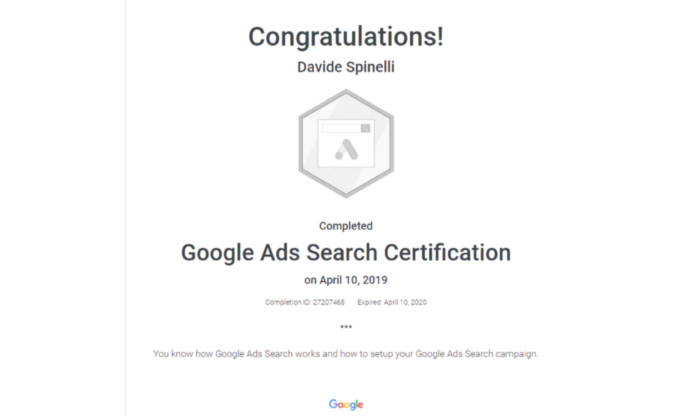
2. You keep assets and creative
Some PPC agencies rely on a pay-per-lead model. Using this model, they drive traffic to a general landing page or advertorial that generates leads for their clients. The downside to this model is the fact that clients don’t receive the landing pages, creative, or assets that went into producing the landing page.
This arrangement is great for agencies but bad for clients.
It’s great for agencies because they’re able to use one landing page or ad with multiple clients in the same industry. Sure, clients receive the leads that they need, but they’re always dependent on the agency that produced them. They never really figure out how to make things work for themselves.
This approach can work.
If you’re only interested in the leads and you’re not interested in creating your own content, landing pages, or marketing in the future, there’s nothing to worry about. If you’re also interested in sticking with the same agency indefinitely, there’s no problem.
Change any of those things, and you may not be able to continue to receive the same amazing results you’ve come to expect in the long term. Insist that your agency provides you with the assets and creative they’ve produced for your business.
3. Total agency transparency
Google requires agencies to be transparent with their clients. This has been a requirement for some time, and it’s another reason why Google Partner and individual certifications are so important.
“If you work with another company to manage your AdWords campaigns, you should be able to find out how much of your advertising budget (cost) was spent on AdWords, how many times your ads appeared (impressions) and how many times users clicked on your ads (clicks). We’ll include these requirements in our legal terms and agreements.”
Google also mentions that almost all of its certified partners are already offering this transparency to its clients. Transparency isn’t common with non-certified agencies; most agencies won’t provide this if clients don’t know any better.
If you’re working with your agency, you should have access to all reports. You should also have access to metrics including impressions, clickthrough rates, keywords, account and ad group structure, and more. If you have questions about where or how your money is being spent, you should receive straightforward answers. Ask your agency about the information they provide to clients if you’re unsure.
4. Short term contracts
Some agencies prefer to lock you into a long-term contract (e.g., 12 or 24 months); this makes sense when you realize it takes a lot of time and resources to set up and launch a new client account. Most AdWords agencies don’t make money on the account until they’re a few months into the campaign.
This arrangement isn’t always what’s best for clients, especially if the agency fails to perform. Clients should be able to come and go as they please. When agencies focus on performing well for clients, the relationship is more stable.
Some agencies can offer month-to-month arrangements profitably. A compromise could be an initial three-month contract that switches to a month-to-month agreement afterward. Whatever you negotiate with your agency, it needs to be beneficial for both. If you’re unhappy with your agency, you should be free to leave.
5. A proven and consistent track record
Your agency should be able to provide you with references and case studies to validate their expertise. There shouldn’t be any doubt about your agency’s ability to perform. You should have the data you need to vet their experience and track record accordingly.
It’s not enough to prove that you’ve achieved amazing results for your clients. You need to demonstrate that you’ve been able to do it consistently over time.
Ask your agency for all of the data you need to validate their performance —references, case studies, anonymized campaign data, and before and after campaign data.
6. A clear process and methodology
Your agency should have an established process for managing and maintaining your account. They should be able to tell you when they add keywords and create new ads, how they set and maintain budgets across keywords and ad groups, and the adjustments or changes they’ll need to make for various markets.
They should also be able to tell you which tests will be run, how they’ll be run, and the metrics or KPIs they’ll be using to validate performance.
7. Optimize for conversions and revenue
I’m not talking about the Ads setting in your account. I’m talking about your agency’s focus on boosting revenue. It’s common for many agencies to focus their attention on impressions or clicks. Your agency should focus on helping you convert those clicks to revenue.
This means your agency needs to focus its attention on:
- Ad messaging, improving the timing, targeting, and placement of your ads
- Conversion rate optimization to improve the performance of copy, landing pages, and offers
- Setting up analytics and reporting to track performance from keywords, to ad groups, to landing pages
- A/B split/multivariate testing to improve campaign performance based on the data you receive from analytics
Google Ads is a direct response platform, so optimizing for conversions and revenue should be your agency’s primary focus. If they’re focused on anything else, they’re not a good fit.
How to Work With an AdWords Agency
Here’s a list of the things your agency will need from you. These requirements aren’t hard, but they do require some effort on your part.
- Trust your agency: Your agency needs your trust. If you’re worried about being burned, watch them closely at the beginning of the relationship. Once you see that they’re competent and they’re able to manage your campaign properly, give them your trust.
- Set quantifiable goals: Clear, measurable goals are what you need. If you’re looking for leads, set realistic goals on the number you need per day/mo. If you have a specific conversion rate, make that clear to your agency. Are you looking for a certain number of bookings? Make the requirements specific.
- Stability and focus: Goal setting is important, but you’ll want to avoid changing your goals and KPIs repeatedly. Your agency needs time to gain traction. Your account managers need time to run tests, analyze performance data, and optimize for KPIs. Changing your goals repeatedly sets progress back, so you’re unable to get the results you want.
- Commit to improvement: If your website can’t convert visitors, PPC is a waste of your time and money. This means tactics like website usability and conversion optimization are important must-haves if you’d like to improve your campaign performance.
- Be flexible with your offers and price: Use promos, discounts, bonuses, or incentives to attract shoppers’ attention. Give your agency the flexibility they need to attract the volume of visitors you need. Let your agency know what your breakeven costs are, then permit them to work with the parameters you’ve set.
- Create good products and services: If your product or service is terrible, conversions will be low. If you’re selling a product no one wants, or they’re unfamiliar with it, PPC won’t change much. Advertising can’t save awful products. Be willing to have a frank conversation about your products and services with your agency.
Give your agency the permission they need to make important decisions on your behalf. Establish a clear point-of-contact so your account strategists can reach out when they need your help. Spell out your expectations and communication standards ahead of time.
If you want weekly communication, let your agency know.
How to Find the Right AdWords Agency For You
You can use Google Marketing Platform Partners, HubSpot Agency Directory, or Clutch.co to find an AdWords Agency. We’ve added a few of the best agencies to make things easier for you.
1. NP Digital – Best for Driving Revenue

My agency, NP Digital, is focused on conversions and revenue. While many agencies are focused on clicks, we focus specifically on driving immediate revenue for our clients. Many agencies focus specifically on PPC ads via Google or Facebook. We offer A to Z paid search support covering: paid media, paid search/shopping, paid social, Amazon, and programmatic advertising.
2. Adventure Media Group – Best for Enterprise AdWords Management
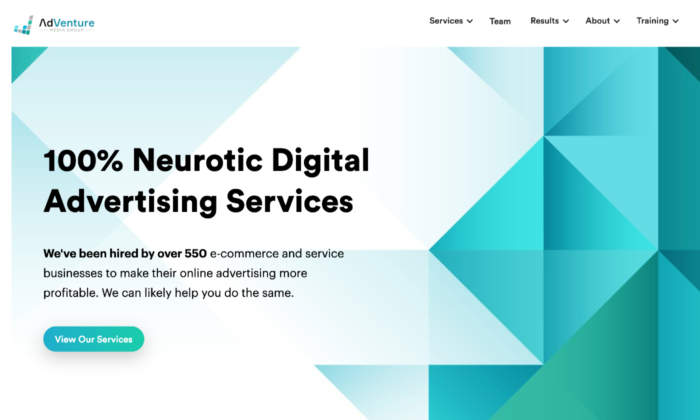
Adventure Media Group got its start as an AdWords training company, then they pivoted to Agency services, focusing specifically on AdWords and landing page design. They’ve grown quickly, shifting their focus to Enterprise AdWords Management.
3. Ignite Visibility – Best for ROI Focus
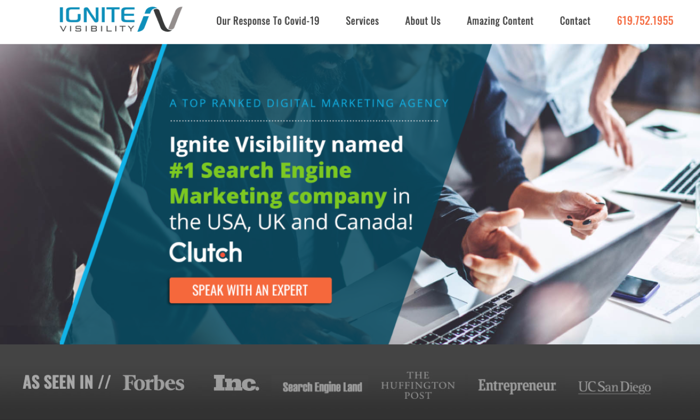
Ignite Visibility lists WeddingWire, Tony Robbins, and Mission Federal Credit Union as their clients. Their agency model is focused on returns. They’re a full-service agency, but they have the experience to manage paid search campaigns across several channels, including — social, display, and programmatic advertising.
4. Disruptive – Best for larger budget PPC focus (10k minimum)
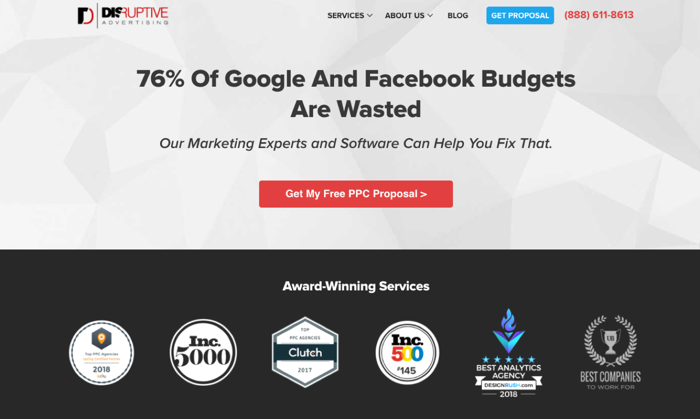
Disruptive Advertising focuses on something they call results-based relationships. Their agency has 152 employees and a high concentration of paid search consultants, something uncommon in the industry. They’ve been listed as a top agency by Clutch.co, Upcity, and others. Their agency focuses on brands with larger PPC budgets.
5. Voy Media – Best for cross-platform ads
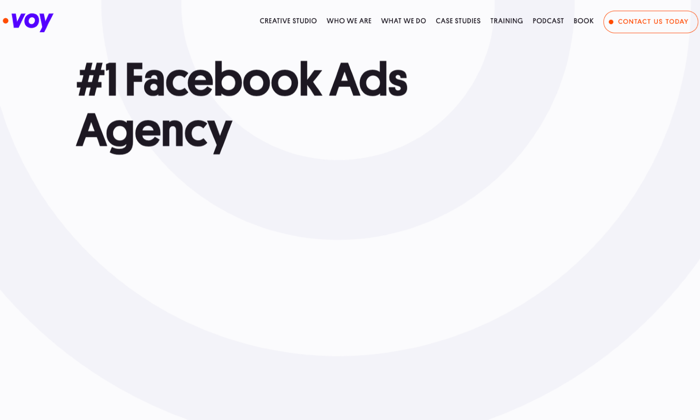
Voy Media focuses on client growth via paid advertising. They describe themselves as the Swiss Army knife of advertising. They’re Facebook Ad specialists as well, so their agency is a good fit for clients who are looking to optimize their ad spend and who also rely on multichannel advertising to grow.
6. Megethos – Best for Technical Industries
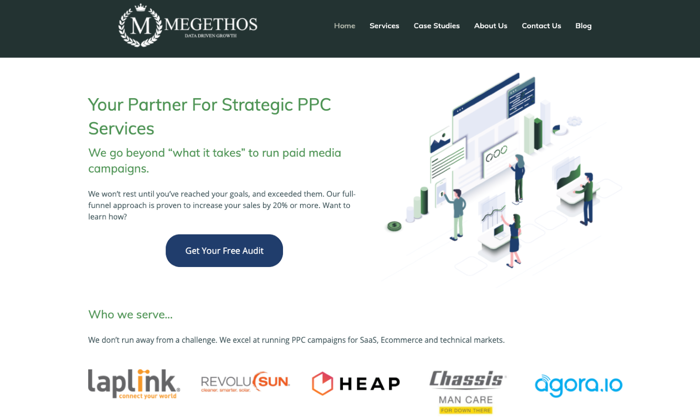
They’re listed as the #1 PPC Agency in Phoenix. They offer clients paid search management and conversion rate optimization services that are backed by their data-driven model. As an agency, they focus on 100 percent transparency with clients. They’re experienced pros when it comes to promoting tech companies, whether they’re in SaaS, Ecommerce, Tech, or Transportation.
7. KlientBoost – Best for Low Budgets
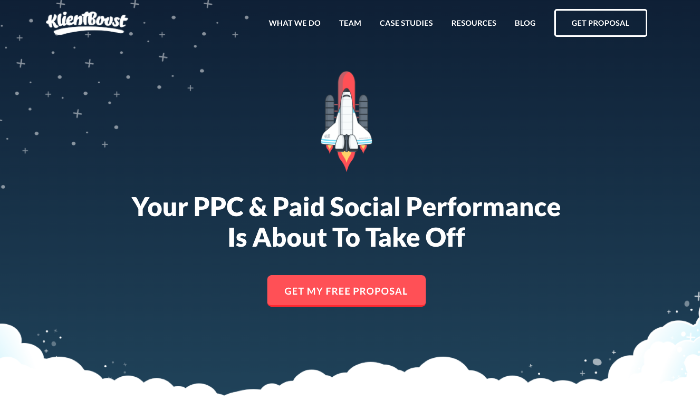
KlientBoost has a unique business model that works well with low/entry budgets. PPC is typically an expensive thing for agencies to ramp up, but KlientBoost can make it work consistently for their clients. Their agency works well with small or local businesses.
8. WebMechanix – Best for Mid-to-Large Businesses
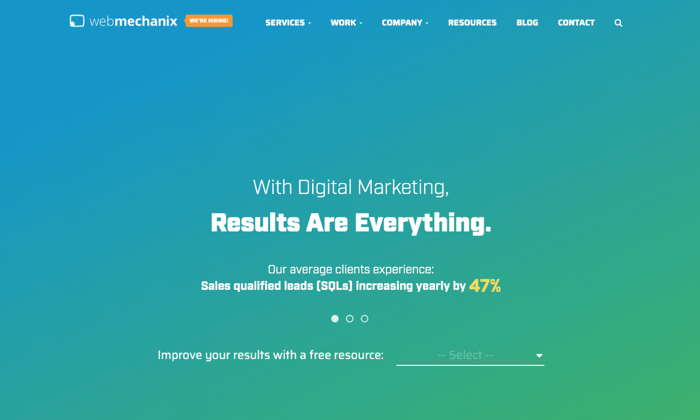
WebMechanix is a performance-based digital marketing agency for mid to large companies. They’re an award winning firm that’s focused on paid search advertising. They offer other agency services as well, but they focus on measurable results and financial impact for their clients.
9. Directive – Best for SAAS Companies
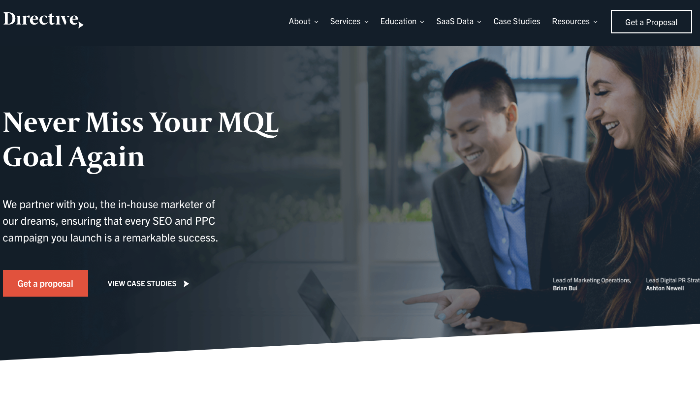
Directive is a paid search agency for software and SaaS companies. They describe themselves as next-gen performance marketing for software. They focus their attention on increasing qualified leads (MQLs) for their clients, helping their sales and marketing teams hit their performance numbers.
10. JumpFly – Best for PPC Specialists
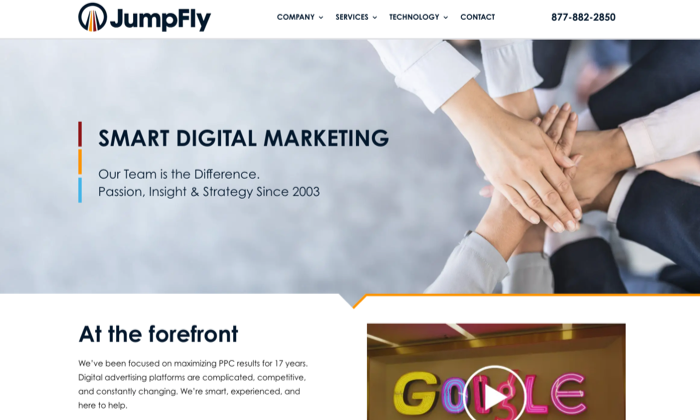
JumpFly specializes in digital advertising focusing on PPC account setup and management for Google Ads, Microsoft Ads, Facebook & Amazon. If you’re looking for a PPC specialist or you’d like PPC specialists to work with your in-house team, JumpFly may be a good fit.
Conclusion
Clicks on your PPC ads are more likely to lead to a sale. It sounds surprising, but paid advertising is still more effective than organic links, even with the growth of ad blockers.
Google Ads work.
But AdWords management is difficult, that’s why you need an agency. Use this post as a guide to choose the right agency to manage your Google Ads. Vet your agency carefully. Then, once you’ve found the agency that fits your needs, give them the tools and resources they need to boost your revenue.
The post How to Choose The Right Adwords Agency appeared first on Neil Patel.
About us and this blog
We are a digital marketing company with a focus on helping our customers achieve great results across several key areas.
Request a free quote
We offer professional SEO services that help websites increase their organic search score drastically in order to compete for the highest rankings even when it comes to highly competitive keywords.
Subscribe to our newsletter!
More from our blog
See all postsRecent Posts
- Web Hosting September 26, 2023
- Affiliate Management September 26, 2023
- Online Presence Analysis September 26, 2023

